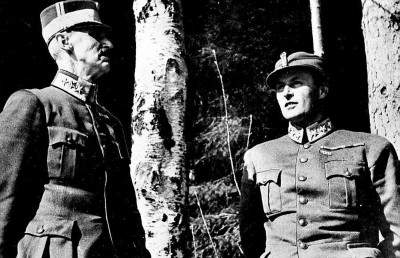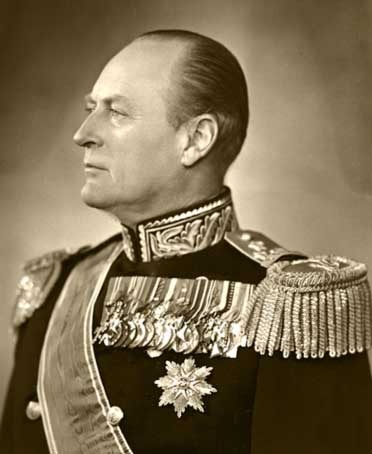Norwegian historians, authors and commentators were scrambling on Friday to try to explain why Norway’s late and much-loved King Olav, long a symbol of Nazi resistance while crown prince in exile during World War II, actually wanted to negotiate with Hitler’s government and didn’t want to leave Norway when the Germans invaded. The revelations in a new book by respected author Tor Bomann-Larsen would seem to tarnish Olav’s place in history, but instead it seems many Norwegians are trying to downplay them.

Some claim Olav, as a 32-year-old crown prince accustomed to a life of privilege, was simply “naive” about the Nazi danger when he wrote a letter in 1935 to his cousin, the Prince of Wales, and suggested that England should negotiate with Hitler. Like many others at the time, Olav viewed the Soviet Union as a greater threat than Nazi Germany, and this comes through in many letters Bomann-Larsen found in British royal archives in Windsor when researching his latest book on the lives of King Haakon and Queen Maud.
Others say the revelation that Olav argued with his father, the late King Haakon VII, over Haakon’s decision to flee Norway instead of capitulating when the Germans invaded on April 9, 1940 merely represents a “modification” of events on that fateful day, and that Olav’s reputation shouldn’t suffer. They argue that Olav ultimately proved his mettle during the war years and that his image in later years as “the people’s king” remains justified.

Bomann-Larsen, who was granted unprecedented access to royal archives with the backing of Olav’s son, the current King Harald V, doesn’t entirely agree. He thinks the information he found in correspondence written by Olav in the 1930s means at least parts of the collective Norwegian perception of the royal family’s position before the war needs to be revised. Bomann-Larsen’s research suggests there may be reasons to question Olav’s judgment, and be grateful his views were overruled.
Bomann-Larsen, speaking about his book for the first time on the popular Scandinavian talk show hosted by Fredrik Skavlan, said it was the chief of the Norwegian army, General Otto Ruge, who stepped in during the argument between Haakon and Olav, clearing the way for the monarch’s opinion to be decisive. Bomann-Larsen said documents he uncovered indicate that the disagreement over whether to leave Norway or stay and negotiate with the invading Germans, was “serious” and that Olav’s willingness to talk with the Germans “must have confused King Haakon.”
Norwegian Broadcasting (NRK), with early access to the Skavlan show due to air Friday evening, reported how Bomann-Larsen tells Skavlan that Olav, earlier in the 1930s, didn’t see Germany as the enemy but rather Russia under the Soviet authorities. Royal families all over Europe had been deeply shaken by the Bolshevik revolution that overthrew the czar and his family, so Olav’s worries were not unique at the time.
Bomann-Larsen said he informed the Royal Palace about the controversial content of his book before releasing it publicly on Skavlan, but palace officials had no immediate comment. King Harald has cooperated with Bomann-Larsen, though, suggesting that the royal family is prepared to deal with the facts he’s dug up.
Stoltenberg joins the royal defense
Prime Minister Jens Stoltenberg was also a guest on the Skavlan talk show, which was taped Thursday evening before its scheduled airing in both Sweden and Norway. Stoltenberg’s appearance on the show itself had made headlines in Norway because the taping collided with an annual dinner on Thursday evening hosted by King Harald at the palace for members of parliament and the government. Some commentators and opposition politicians thought Stoltenberg had his priorities wrong when accepting an invitation from Skavlan over King Harald’s, but Stoltenberg’s office responded that, among other things, it was an important opportunity for Stoltenberg to thank a large Swedish audience for Sweden’s support during last summer’s terrorist attacks.
Stoltenberg also joined the chorus of those defending, even making excuses for, then-Crown Prince Olav, stressing that the invading Germans did, in the end, face resistance from the royal family despite Olav’s willingness to negotiate. “The royal family should be judged on what they actually did,” Stoltenberg said. “They said ‘no’ (to cooperating with Hitler’s government) and they became a unifying symbol for the resistance campaign.”
He conceded that Olav’s opinions at the time have, until now, been left out of public debate. “But again, the decisive factor is that they (the royals) made the right choice,” Stoltenberg said.
Questions also over euthanasia
Bomann-Larsen’s book also raises the question of whether Queen Maud, the British princess who married Haakon when he was still a Danish prince, died in London in 1938 as a result of euthanasia administered by her trusted British doctor. Maud had suffered various health problems for years.
“No one received much information about her death for many decades afterwards,” Bomann-Larsen told Skavlan. “And her doctor had positive attitudes about euthanasia. He had used it before.”
One of Bomann-Larsen’s earlier volumes in his ongoing series of historical books about Haakon and Maud suggested that Maud’s doctor also had treated her with an early form of artificial insemination that led to the birth of Olav. Haakon and Maud had remained childless for many years before Olav’s birth in 1903.
Views and News from Norway/Nina Berglund
Please support our stories by clicking on the “Donate” button now:

